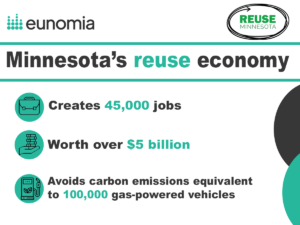Reuse businesses have profound positive impact on Minnesota’s economy and environment
A new study published today has found the reuse economy in Minnesota is worth over $5 billion, creates 45,000 jobs and takes the equivalent of 100,000 gas-powered vehicles off the roads in avoided greenhouse gas (GHG) emissions each year.
With the need for new green jobs, the reuse economy delivers many of the benefits these jobs would bring.

The report, entitled “Measuring statewide impacts of reuse,” was commissioned by Reuse Minnesota with funding from the Minnesota Environment and Natural Resources Trust Fund, and conducted by Eunomia Research & Consulting, a leading international circular economy consultancy.
Reuse is the continued use, repair, or repurposing of items or materials which extends the life of resources and decreases demand for new production and includes such businesses as thrift stores, repair shops, and rental outlets.
Reuse activities directly benefit the state economy by generally taking place within local communities, with the revenue of these activities estimated to be around $3.1 billion plus a further $2.4 billion social value in wages, taxes and shareholder profits.
Unsurprisingly, as the state’s largest population center and economic hub, the Twin Cities Metro area avoided the most emissions at 66% and accounted for almost half of all reuse jobs.
The findings add to Minnesota’s green credentials after Eunomia’s 50 States of Recycling report found that its recycling rate for packaging was the highest of any US state without a Deposit Return System (DRS).
The new study applies an improved methodological approach that applies weightings to businesses which only undertake some reuse activities such as book stores which sell new and used books. This provides a more accurate picture of the economic, social and environmental benefits from the sector when compared to a previous study done in 2020.
Emily Barker, Executive Director of Reuse Minnesota said: “This study demonstrates the profound impact reuse has on the local Minnesota economy and environment. It’s not a choice between economic growth or improving our environment, we can do both and the findings really reinforce that belief. We intend to repeat the study using the same model every five years and hope to continue to show progress towards cutting carbon emissions while creating good green jobs for Minnesotans.”
Sarah Edwards, Eunomia’s Director of North America added: “This report is important for emerging policy discussions on the role of reuse in the circular economy. It demonstrates that there are environmental, social and economic benefits which support a transition to a reuse economy. Reusing materials and extending their life cycle to delay or prevent the production of new products allows us to live more sustainably within a circular system. The current prevailing take-make-waste economic principles are both inefficient and insufficient in limiting climate change. The model we developed for this study will be a much more accurate reflection of the benefits the reuse economy has on Minnesota compared to previous studies.”
